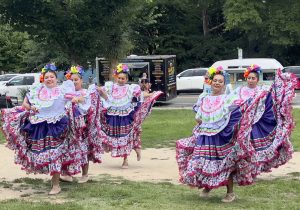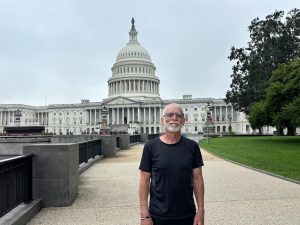Durham County ranks last in the Triangle for its response to the 2020 census, with 56.4% of residents having submitted census forms as of June 28.
During a typical census-taking year, the U.S. Census Bureau would have sent door knockers to find those who have not responded on their own. But with the coronavirus’ unexpected arrival, efforts to count everyone have shifted.
How many Durham County residents are tallied will dictate many important things in the next 10 years. Public school funding, congressional representation, and millions of federal dollars are some of what is at stake.
For every person uncounted in Durham, the county loses more than $1,600 a year. This amounts to more than $16,000 per person missed over a decade, according to Kate Fellman, co-chair of the Durham Complete Count Committee.
“It’s really important that we get this right,” said Aidil Ortiz, an East Durham resident and volunteer member of the Durham Complete Count Committee.

Census enumerators, better known as census takers, will begin a soft launch next month in six yet-to-be-announced regions, according to the Census Bureau. Each will be trained on social distancing protocol and provided with personal protective equipment (PPE).
Enumerators start by interviewing people in households that haven’t yet responded to the census. The effort to count people experiencing homelessness will begin in September.
Some communities are harder to count than others during a census. Immigrants, especially those without legal immigration status, Latinx and Black people, non-English speakers, people with low incomes, and people who are homeless tend to be less likely to respond to the census unless someone reaches out, according to Ortiz.
Ortiz emphasized the need for institutions to leave the four walls of their office and do more than just electronic outreach. With Durham’s ever-growing population, accounting for everyone living here is a top priority.
“Doing distribution of anything is very hard work and taxing, and it carries risk,” Ortiz said. “You have to do the work with more than one mission in mind, to try to be as efficient as possible.”
Creativity has shaped a lot of the ground effort for getting the word out on the census here, especially with social distancing requirements in effect.
A Juneteenth car parade in East Durham on June 20 combined a celebration of African American freedom, handouts on coronavirus safety information and masks, voter registration information, and census information.
Local organizers supporting a full count in Durham sent out 1,000 flyers last Friday to food pantries and organizations that provide meals to people in need. These flyers explained how to vote in upcoming elections and how to fill out the census.
Ortiz and other organizers plan to work with grocery stores like Compare Foods and Los Primos to get census flyers in grocery bags and park outreach vans outside the stores.

Ortiz says that these groups, which include SpiritHouse NC, El Centro Hispano, and My Black Counts NC, are considering replicating the Juneteenth parade in another location if response to the census along the original parade route increases within the next few weeks.
Outreach at places like neighborhood parades and grocery stores allow people who are local and known in the community to apply their expertise, Ortiz said. Part of this work is myth-busting, especially among people who are suspicious that any information they share could be used against them.
“People want to know what is going to happen with their information and how it is tracked,” said Ortiz. That includes whether social security numbers or citizenship status are required when answering the census. (They are not.)
The census “is a way of putting in a vote for resources if [you] can’t actually vote,” referring not only to undocumented immigrants, but to young residents and other non-citizens as well, says Ortiz said.
Due to the new coronavirus outbreak, the deadline to respond to the census has been extended to Oct. 31, 2020. For more information, visit https://census.nc.gov/.
9th Street Journal Reporter Veronica Niamba can be reached at veronica.niamba@duke.edu
At top: Due to the coronavirus outbreak, participants in the Juneteenth parade encouraging people to fill out the census drove rather than walked the East Durham route. 9th Street Journal file photo by Henry Haggart






